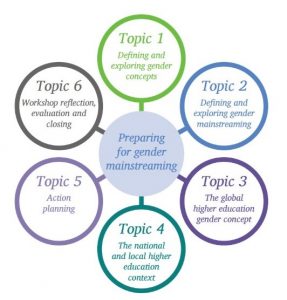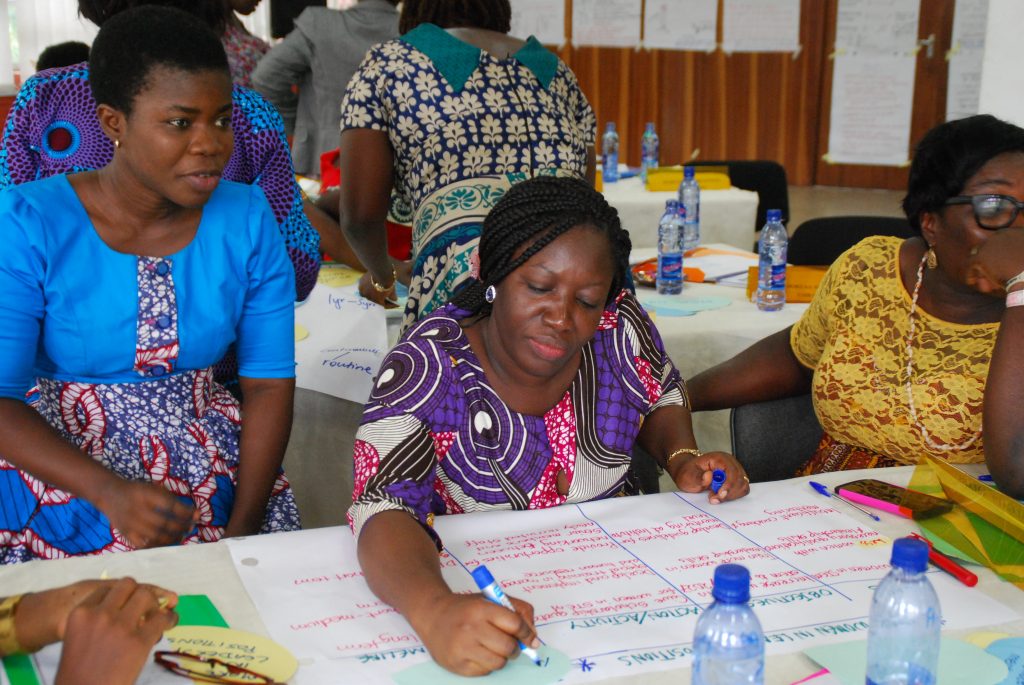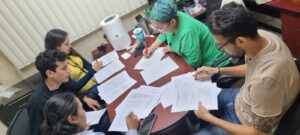Mind the gap: Creating agents of change to address gender inequity in research
Gender inequalities in research and higher education are often present but not recognized or acknowledged. However, evidence shows that in many countries women face more barriers to pursuing research and academic careers than men. Only 28% of researchers worldwide are female[1] and this gender gap is also evident in the few female academics in leadership positions within institutions.
 In 2016, INASP launched the Gender Mainstreaming in Higher Education Toolkit, based on a workshop conducted by the University of Dodoma, Tanzania. The toolkit provides institutions interested in tackling gender inequality in higher education with the materials and resources needed to run a sensitisation workshop within their institution.
In 2016, INASP launched the Gender Mainstreaming in Higher Education Toolkit, based on a workshop conducted by the University of Dodoma, Tanzania. The toolkit provides institutions interested in tackling gender inequality in higher education with the materials and resources needed to run a sensitisation workshop within their institution.
Last month we put the Toolkit into action by supporting Ghana’s foremost national science and technology institute, the Council for Scientific and Industrial Research (CSIR), to launch a gender mainstreaming process – starting with a gender sensitization workshop for 30 women researchers drawn from CSIR head office and various institutes under CSIR.
CSIR senior management have recognized that scientists and technologists around Ghana cannot achieve the results they are looking for if gender is not taken into consideration.
Professor Mary Obodai, Director, Food Research Institute explains, “The CSIR has been perceived as a male dominant place of work. As a result, appointment of staff has been skewed in favour of males – in 2014, only 83 of the 550 Senior Members were female and until recently, Directors of the Council were all males. SDG 5 (Achieve gender equality and empower all women and girls) has one of its targets: ‘Ensure women’s full and effective participation and equal opportunities for leadership at all levels of decision-making in political, economic and public life.’ This target requires strengthened efforts to ensure women’s full participation in all spheres. With this notion, this workshop was undertaken to sensitize female scientists, technologists and administrators to ensure gender mainstreaming in the CSIR. Part of the objective was to explore why few female staff are appointed in the Council and what hindrances affect the progression of the few females in the system.”
Throughout the course of the 3 ½ day workshop, participants were led though six modules, from exploring gender concepts, to considering gender in the higher education context, to developing an initial action plan based on the workshop outcomes.
Shifting mind set
The impact on participants was powerful – and evident even after day one. Participants reflected that recognizing gender stereotypes and unconscious bias is a significant first step towards addressing gender gaps.
“We really need to do gender mainstreaming to move away from the stereotyping in order to address the potential of everyone – men and women. Everyone.”
Many of these women were the only females in their department or laboratory – to be working as researchers or technologists, they had overcome significant challenges and demonstrated considerable self-determination.
“Socialization is key, in my experience. I went into engineering and my parents rang someone up to tell me why I should not be an engineer – that I would not get a job, it would be too hard…”
Yet despite this, the topic of self-suppression (as a result of women feeling timid, lacking in confidence or fear of being labelled a misfit) struck a chord with many participants:
“Some of these issues may be because of the way we work with the men. In my [research area], we go into the field a lot. Sometimes they think we can’t do it because the place is dangerous and the men tell you to sit down, and it’s easier to say “okay, you do it then”, but perhaps we need to show we can do it.”
“Women, if they don’t know something, will hold back. Women are more likely to say “oh, this isn’t my field.” Men, they are more likely to go do something, and then learn it while they are doing it.
The importance of supporting other women was a very strong theme:
“As women we have to help the young ones. We have come here and we have learnt a lot, but what about the other people in CSIR, the younger ones – at home – at church, wherever. So in my own small way, whatever I can do to share and try to explain to other people what’s gender mainstreaming is all about – and also encourage them; use my small experience to let them know that they can balance life at home and life at work.”
“I think for us, what is needed is a change of mind-set. Normally you like to shine by yourself – in the institute you want people to see that you are the only one who can do something. But now the time has come to help other people and women to shine. So if you see that your colleague is not so good to speak in public, we should help them – if a women speaks with a low voice, we should support her and show that we have understood what she said. Let us shine together, and let us change our mind-set.”
Immediate impact
During the course of the workshop, participants from across the CSIR research institutes found common ground and developed powerful peer support networks:
“I think what has touched me the most is the personal relationships that I have developed with everyone here… I’m newly married and there are so many things you have [all] taught me.., like stuff about how to manage your home and how to balance your work, and how far they’ve come – especially the research scientists – some are principle research scientists – it’s so impressive. It has given me a lot of hope that I can do it. Like when I start having children, it’s not impossible. So I’m going to aim higher, and I’m not really afraid anymore. I can also do it, so I’m very grateful.”
Pre/post test results showed that participants knowledge of gender mainstreaming, and their confidence to address issues had both increased significantly.
At the end of the workshop participants had a much better understanding of the difference between gender and sex. There was a 20% increase in the view that addressing gender issues should be the concern of everyone, not just women – from 80% to a unanimous 100%.
The strength of confidence in the ability of CSIR to address gender inequalities within the organization had increased (69% completely agreeing post-test compare to 53% during the pre-test), and the overall personal confidence in speaking about gender issues had increased significantly (from 57% to 92%).
Even participants who admitted to being previously sceptical about attending the workshop had gained an appreciation, and appetite, for robust and sustainable gender mainstreaming approaches:
“Integrating gender into research scientist’s thinking is more than just saying “oh gender, She is sitting there” [pointing to gender expert]. We think we have knowledge of gender, but the knowledge is not the same as doing it….”
Catalysing change
A major goal of the workshop was to support the development of an action plan to help CSIR implement gender mainstreaming processes. During the final phase of the workshop, participants defined a series of strategic objectives, and determined the activities needed to achieve these goals. Areas of focus included:
- Sensitizing staff at all levels on gender and gender mainstreaming processes
- Achieving more women in leadership positions
- Establishing gender equity measures within the organization
CSIR are currently reviewing and prioritizing elements of the action plan and instigating a Gender Working Group to drive forward the process. In the meantime, participant evaluation showed that the workshop successfully creating a group of gender mainstreaming advocates and agents of change within CSIR. Participants were asked to share their most significant learning point: 47% of responses were related to sharing the knowledge that they had gained, with a further 13% responding that they intended to actively advocate for improved gender equity within their institutions:
“I will empower others on gender mainstreaming as well as be an agent of change in my institute”
“Nothing should intimidate me from attaining a leadership position. I will be self-determined.”
“The workshop has been awesome and I will carry every single moment of it with me for a very long time.”
“So there is something very striking… and that’s women are influential…. No matter where, no matter the numbers. Speak out and if they don’t listen, echo that place and they will listen. So, it doesn’t matter whether we don’t have the numbers, we are aware here that if we stand up, things can change.”
[1] http://www.uis.unesco.org/ScienceTechnology/Documents/fs34-2015-women%20in%20science-en.pdf
Photo taken during CSIR workshop.


 Next Post
Next Post


